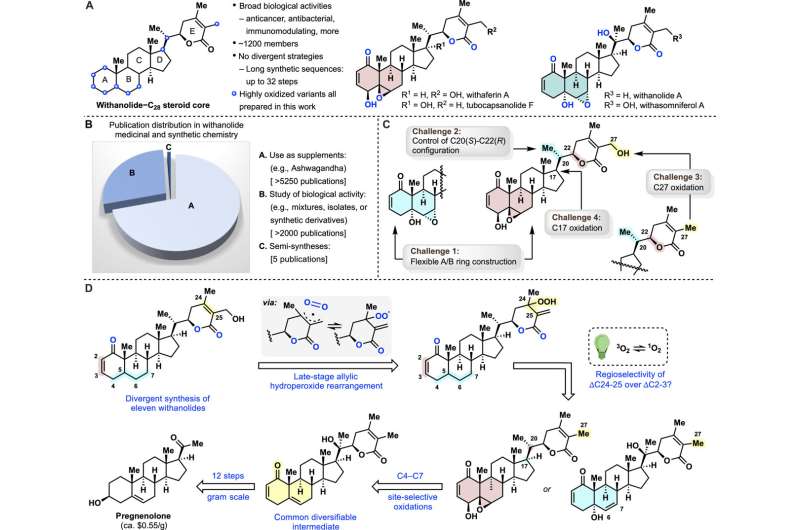This article has been reviewed according to Science X's editorial process and policies. Editors have highlighted the following attributes while ensuring the content's credibility:
fact-checked
peer-reviewed publication
trusted source
proofread
Researchers develop scalable synthesis of cancer-fighting compounds

Withanolides, a class of naturally occurring compounds found in plants, have long been a focus of cancer research due to their ability to inhibit cancer cell growth, induce cell death and prevent metastasis. These compounds are important in developing new cancer treatments. However, the difficulty of obtaining enough of these compounds from plants has hindered research and therapeutic development.
Moffitt Cancer Center researchers have developed a groundbreaking method for the scalable synthesis of withanolides. This innovative approach, published in Science Advances, could revolutionize cancer research by providing a reliable and efficient means of producing these vital compounds in large quantities, paving the way for new and more effective cancer treatments.
"Our new synthesis route represents a major step forward in the field of withanolide chemistry," said Justin M. Lopchuk, Ph.D., lead author and associate member of the Drug Discovery Department at Moffitt. "By enabling the diversifiable production of these compounds on a gram scale, we can now support more extensive biological research and medicinal chemistry efforts."
Key aspects of the new synthesis include a bioinspired photooxygenation-allylic hydroperoxide rearrangement sequence, which facilitates the introduction of functional groups at the late stages of the synthesis. This approach ensures scalability and allows for the concise preparation of numerous different withanolides from the same synthesis. It also removes the dependency on plant extraction, which is time consuming and limited by the natural abundance of these compounds.
The scalable synthesis of withanolides means that scientists can now produce these compounds in larger amounts, facilitating new research and accelerating the development of withanolide-based cancer treatments. Unlike conventional treatments targeting a single pathway, withanolides act on multiple cellular pathways. They can interfere with cancer cell division, damage the cellular structures of cancer cells and modulate the immune system to enhance the body's ability to fight cancer. Additionally, they have the potential to enhance the effectiveness of cancer treatments by making cancer cells more sensitive to chemotherapy and radiation. They have shown efficacy against a range of cancer types, including breast, lung, colon and prostate.
Another critical aspect is their ability to overcome drug resistance. Cancer cells can develop resistance to conventional treatments over time, but withanolides, due to their unique mechanisms of action, may help overcome this resistance and remain effective where other treatments fail.
"Now that we have a reliable method to produce withanolides, we can focus our studies on creating new therapeutics to help cancer patients," Lopchuk said.
More information: Wen Che et al, Divergent synthesis of complex withanolides enabled by a scalable route and late-stage functionalization, Science Advances (2024). DOI: 10.1126/sciadv.adp9375



















